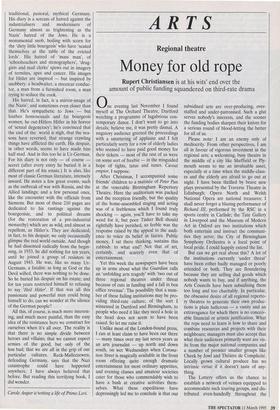ARTS
Regional theatre
Money for old rope
Rupert Christiansen is at his wits' end over the amount of public funding squandered on third-rate drama 0 ne evening last November I found myself at The Orchard Theatre, Dartford watching a programme of lugubrious con- temporary dance. I don't want to go into details; believe me, it was pretty dismal. A nugatory audience greeted the proceedings with a smattering of applause and I felt particularly sorry for a row of elderly ladies who seemed to have paid good money for their tickets — most of the rest of us were on some sort of freebie — in the misguided hope of tights, tutus and tunes. Caveat emptor, I suppose.
After Christmas, I accompanied some friends' children to a matinee of Peter Pan at the venerable Birmingham Repertory Theatre. Here the auditorium was packed and the reception friendly, but the quality of the home-assembled staging and acting was of a feebleness which I found truly shocking — again, you'll have to take my word for it, but poor Tinker Bell should rightfully have perished, so feeble was the response raised by the appeal to the audi- ence to voice its belief in fairies. Public money, I sat there thinking, sustains this rubbish: to what end? Not that of art, certainly, and scarcely even that of entertainment.
Yet this week the newspapers have been up in arms about what the Guardian calls an 'unfolding arts tragedy' with 'two out of three regional theatres under threat because of cuts in funding and a fall in box office revenue'. The possibility that a num- ber of these failing institutions may be pro- viding third-rate culture, of the sort I witnessed in Dartford and Birmingham, to people who need it like they need a hole in the head does not seem to have been raised. So let me raise it.
Unlike most of the London-bound press, I can at least claim to have been out there — many times over my last seven years as an arts journalist — up north and down south, on wet Wednesdays when Corona- tion Street is magically available in the front room offering quite enough dramatic entertainment for most ordinary appetites, and evening classes and amateur societies cater for those who commendably wish to have a bash at creative activities them- selves. What these expeditions have depressingly led me to conclude is that our
subsidised arts are over-producing, over- staffed and under-patronised. Such a glut serves nobody's interests, and the sooner the funding bodies sharpen their knives for a serious round of blood-letting the better for all of us.
Please note: I am an enemy only of mediocrity. From other perspectives, I am all in favour of vigorous investment in the regional arts: a welcoming, busy theatre in the middle of a city like Sheffield or Ply- mouth seems to me an invaluable asset, especially at a time when the middle-class- es and the elderly are afraid to go out at night. I have been thrilled by brave new plays presented by the Traverse Theatre in Edinburgh; Opera North and Welsh National Opera are national treasures; I shall never forget a blazing performance of Richard III, performed by the RSC in a sports centre in Carlisle; the Tate Gallery in Liverpool and the Museum of Modem Art in Oxford are two institutions which both entertain and instruct the communi- ties they serve; the City of Birmingham Symphony Orchestra is a focal point of local pride. I could happily extend the list.
But can we get real about this? A lot of the institutions currently 'under threat' have been either badly managed or poorly attended or both. They are floundering because they are selling dud goods which nobody wants to buy, and if anything, the Arts Councils have been subsidising them too long and too charitably. In particular, the obsessive desire of all regional reperto- ry theatres to generate their own produc- tions is plain ludicrous — a vanity and an extravagance for which there is no conceiv- able financial or artistic justification. What the reps need to learn is how to share and combine resources and projects with their neighbours; managers must also accept that what their audiences primarily want are vis- its from the major national companies and a number of premier smaller groups like Cheek by Jowl and Theatre de Complicite. Locally grown cultural produce has no intrinsic virtue if it doesn't taste of any- thing.
The Lottery offers us the chance to establish a network of venues equipped to accommodate such touring groups, and dis- tributed even-handedly throughout the country: this seems to me of far more importance than the survival of, say, the Redgrave Theatre, Farnham, closed since Christmas with a £160,000 deficit according to the Guardian, but within an hour's drive of similar premises in Croydon, Guildford, East Grinstead, Woking, Richmond, Wimbledon and Windsor, let alone 50 or more such theatres in Greater London.
As it stands, one of the crucial mistakes made by arts funding bodies over the last 20 years has been the spreading of their funds too widely and thinly. The philoso- phy of 'access' — the notion that we all have a divine right to walk into culture any time we like, at no personal cost or effort, as though it was some sort of welfare enti- tlement — has blinded the mandarins to the fact that most people simply do not want to go to the ballet or opera, and that those who do are generally able to buy a ticket or organize some independent means of transport in order to fulfil their wish. There is no perceptible need for a profes- sional theatre in every town, and the waste- ful expenditure on the arts in France and Germany is no sort of evidence in favour of the argument that there is. The pious exclamations one hears on this subject are infuriating. Sometimes it seems as though the arts are being turned into a missionary unit of the social services, instead of being allowed to stand up in an adult world in which they speak for them- selves. I only hope that following the good sense of its recent report on the over-provi- sion of opera in London, the Arts Council of England's forthcoming attempt at set- ting a policy for drama will recognize that inert regional theatres cannot expect to be maintained on life-support machines indefinitely. Those responsible — often local authorities hard-pressed to administer public libraries and sports facilities shouldn't be afraid to pull the plug when the patient's heart has clearly stopped beating.



























































 Previous page
Previous page